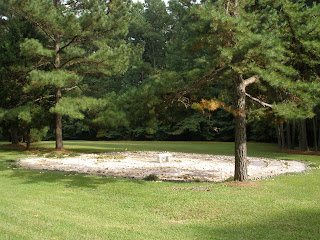"See, I am doing a new thing!
Now it springs up; do you not perceive it?
I am making a way in the wilderness
and streams in the wasteland."
Isaiah 43:19
Earlier this week, I read a blog post by Johan M. The whole post was good, but one part jumped out at me. Johan asked,
"Are there Friends who actually have a direct message on their hearts for our new audience? Perhaps we're not limited to translating existing texts, but will be hearing from someone with a fresh word."
In particular, it was the last part, the part about a fresh word. I had heard that phrase before, but in reading it there, it had new life. I wrote it down and I have it on my desk at work where I can see it.
Recently, I have been feeling a heaviness around the Religious Society of Friends, mostly having to do with money and maintaining institutions. I feel like we need a fresh word. So that is my prayer for myself and for Friends.
I shared that prayer during our time for petitions at Freedom Friends Church this morning. Later, during open worship, I gave the following message:
The last time I was at a gathering for Friends World Committee for Consultation was almost exactly three years ago. It was in March, 2009, in Canby, Oregon―not very far from here. During that gathering, God gave me a message to give to the group, but I did not give it. Afterward, I felt awful. I knew that I had been unfaithful, and I thought I was going to be sick.
When I first started feeling led to go to the World Conference in Kenya, I didn't want to go. I fought with God, as I often do. And I wondered if God was making me go to Kenya because I did not share the message I was given at the last gathering―if, because I didn't give the message nearby, I would have to go halfway around the world to give it.
Now my trip to Kenya is soon, and I'm not angry anymore. I am excited about it.
The message that I didn't give was very short: You have everything you need. It would have been so easy to give that message―you have everything you need.
Since not giving the message, I have noticed that it has stayed with me. A lot of things have happened in the past few years. At times, I have been unemployed, or I haven't known where I was going to live, or I have had very little money in my bank account. But I have always had everything I needed.
I do not know whether this is the message that I am supposed to give at the World Conference, but I do believe that there is a reason that I am going. And I am grateful for all of you for holding me when I go.
After meeting, a weighty Friend said that my message sounded like experiences he had read in journals of 18th and 19th century Friends who, early in their ministry, felt led to give a message, but did not for one reason or another. He reminded me that those Friends were later called on to speak. I am sure that I will be as well.
When I got home, I posted on facebook that I was praying for a fresh word. Almost immediately, Brian, a friend of mine from high school, suggested "callipygian." (Go ahead, look it up. I'll wait.) While I doubt that "callipygian" is the fresh world I will be bringing to Kenya, the comment is another reason I am grateful to be part of a larger community―other people remind me to keep a sense of humor!



